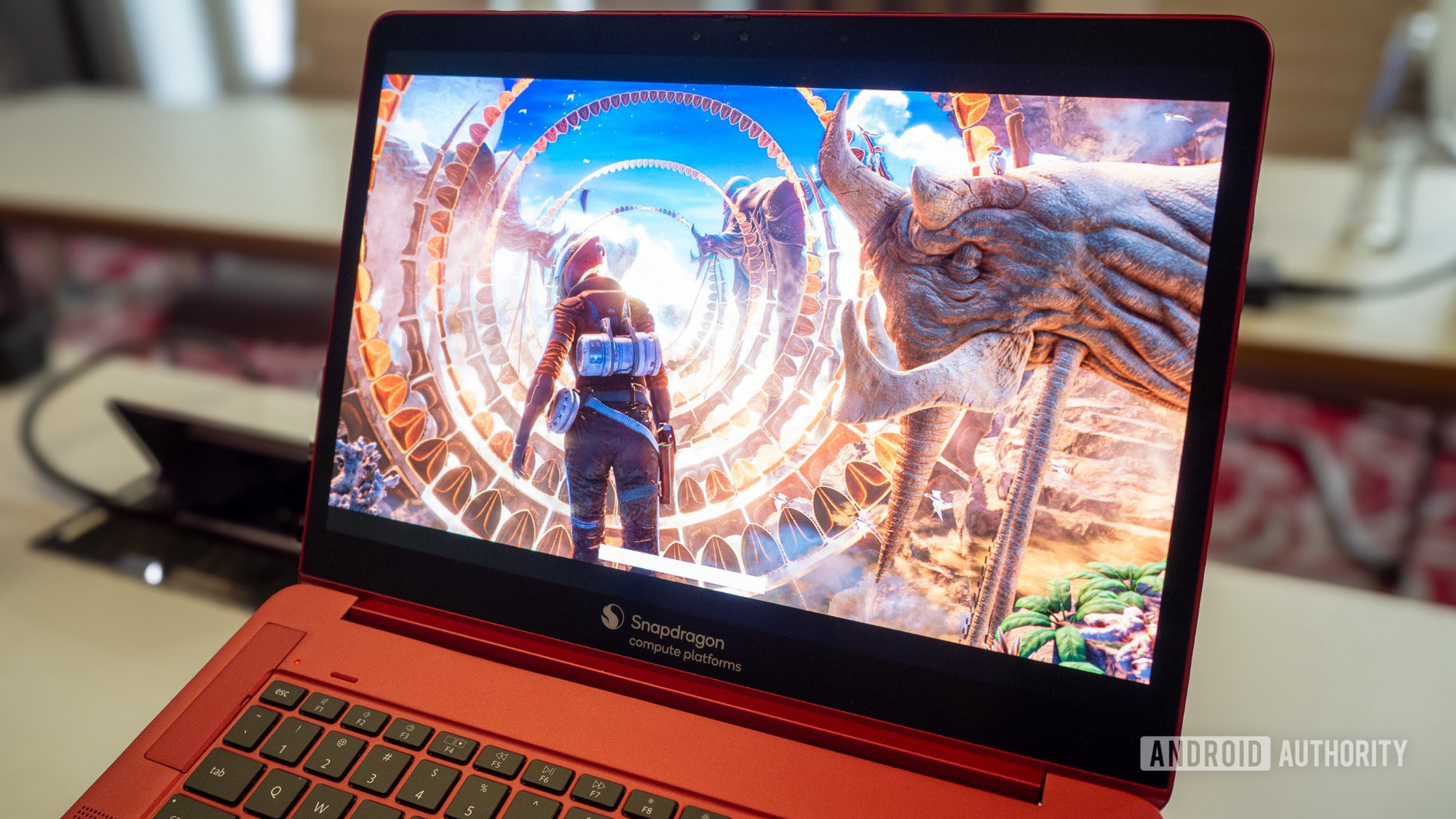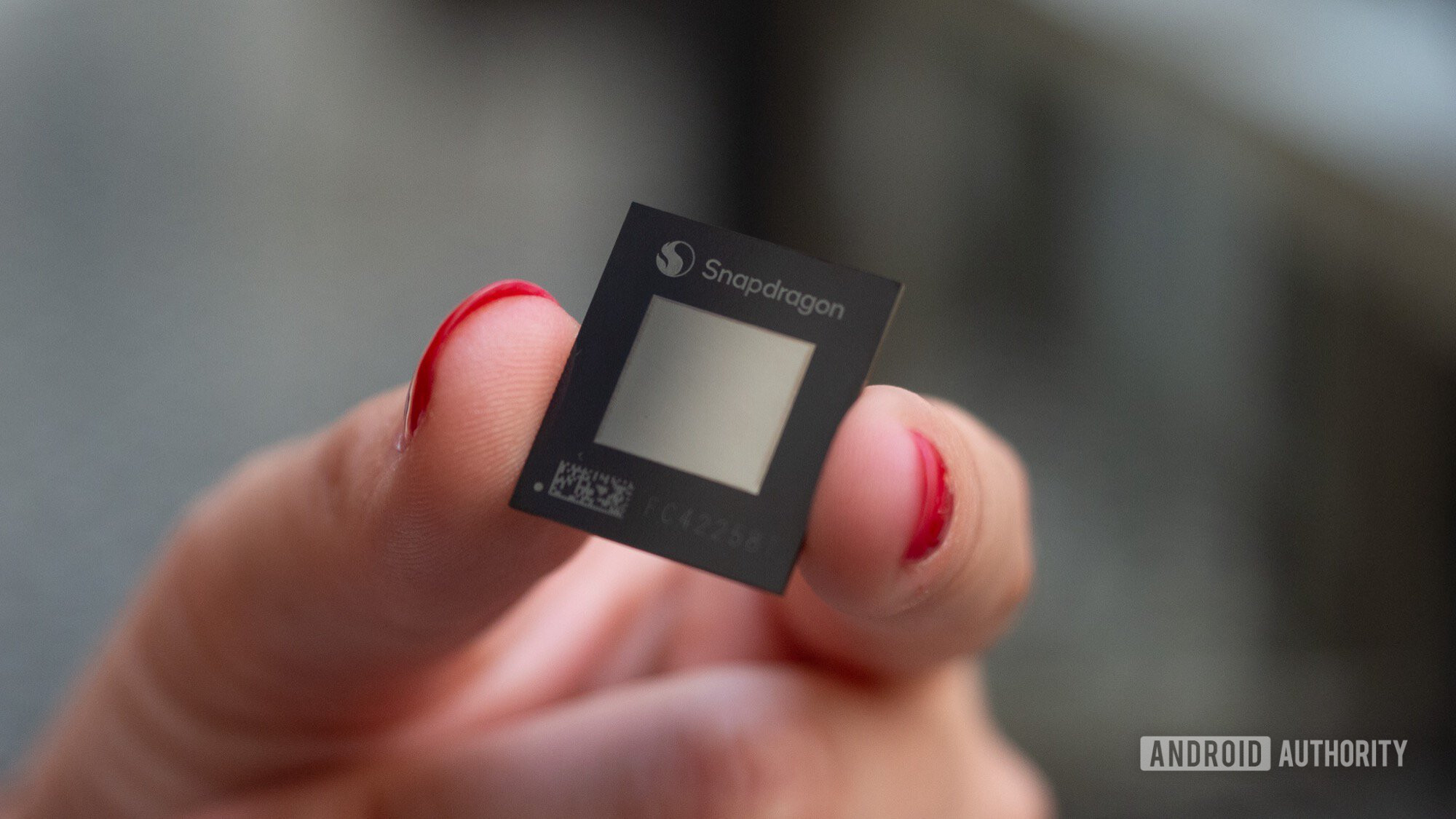Affiliate links on Android Authority may earn us a commission. Learn more.
Qualcomm Snapdragon X Plus benchmarked: Faster than a MacBook Air?
Published onSeptember 7, 2024

After the first premium Qualcomm Snapdragon X Elite-powered laptops launched earlier this year, the mobile silicon maker announced a more budget-friendly Plus version of its Arm-based chip for Windows. This week, the introduction of an eight-core Snapdragon X Plus mode made things even more interesting for affordable laptops.
If you want the battery and AI benefits of a Copilot Plus PC but without the flagship costs, you’ll probably be interested in one of these new chips, so long as it performs decently. At IFA 2024, we attended a benchmarking session to put the new chip through its paces.
Qualcomm had two models to showcase. A higher-end reference laptop sporting the X1P-46-100 chip and an Asus Vivobook S15 with the most affordable X1P-42-100 variant. You can see their specs below.
| Qualcomm Reference Design | ASUS Vivobook S15 | |
|---|---|---|
Chipset | Qualcomm Reference Design X1P-46-100 | ASUS Vivobook S15 X1P-42-100 |
CPU Cores | Qualcomm Reference Design 8 | ASUS Vivobook S15 8 |
CPU Max Clocks | Qualcomm Reference Design 4.0GHz single-core boost 3.4GHz multi-cire | ASUS Vivobook S15 3.2GHz single-core boost 3.4GHz multi-cire |
GPU | Qualcomm Reference Design 2.1 TFLOPS | ASUS Vivobook S15 1.7 TFLOPS |
NPU | Qualcomm Reference Design 45 TOPS | ASUS Vivobook S15 45 TOPS |
We also grabbed the results from our previous Snapdragon X Elite benchmarking session to see how the new chip compares to its bigger brother and some of Apple’s silicon we’d previously tested.
As you’d expect, the drop-down from twelve Oryon CPU cores in the X Elite chip to just eight in the new, much smaller Plus model has a big effect on multi-core CPU performance. Geekbench 6 is about 25% slower than Qualcomm’s beefiest configuration, and CineBench 2024 is a whopping 45% slower for the X1P-42 model, likely owing to the smaller 30MB cache, down from 42MB.
There's a big performance gap between these two 8 core chips. Choose wisely.
Just like the various Elite chip variations, single-core performance depends a lot on which of the Plus models you get as well, owing to their peak clock speed differences. The weakest X1P-42 model is about 20% slower, while the X1P-46 is only 8% off the pace of Qualcomm’s most power-hungry X Elite implementation. This is reflected in the graphics department too, where a substantially weaker Adreno GPU implementation (just 1.7 and 2.1 TFLOPs versus 3.8 TFLOP in most Elite laptops) sees the two Plus models drop well off the pace of the Elite, which isn’t a gaming platform anyway.
Of course, we expected performance drops; the real question is whether the new eight-core Plus chips are competitive in their price segment. Qualcomm says they’ll start as low as $799.

Apple’s “budget” MacBook Air ($799 at Amazon) sports a slightly older Apple M2 chip that’s also based on the Arm architecture. The good news is that even the weaker Snapdragon X Plus model is competitive on single-core and bests the Apple M2 for multi-core CPU performance. That’s quite the scoop.
However, the MacBook Air’s powerful 8-core GPU flies past the Snapdragon X Plus models in 3DMark’s graphics test. It offers about double the performance of the lowest-end Qualcomm chip, making it a more capable gaming platform and lending it a boost for GPU-accelerated work. Depending on your workload, the MacBook might still be a better bet.
Qualcomm scores a win over the MacBook Air, but it's not a slam dunk.
Of course, benchmarks aren’t always reflective of the exact performance you’ll see in the real world. We’ve had a hit-and-miss experience with Microsoft’s Prism emulator, which can knock quite a few percentage points off the performance of x64 Windows applications running on Arm. We’re also still waiting on a few more interesting use cases for those 45 TOPS of NPU performance besides the so-so Windows Recall.
So, should you run out and buy one of these more affordable Snapdragon X Plus PCs? Well, it depends on the price and which chip you get. The ASUS Vivobook S15 benchmarked here costs $1,299.99, a pretty raw deal given that it’s right at the bottom of the pack performance-wise. I’d buy the new Microsoft Surface Laptop ($999 at Microsoft), which has a far more powerful Snapdragon X Elite chip. However, the Lenovo ThinkBook 16 Gen 7 will start at around $749, making it a much more compelling budget Copilot Plus PC option.